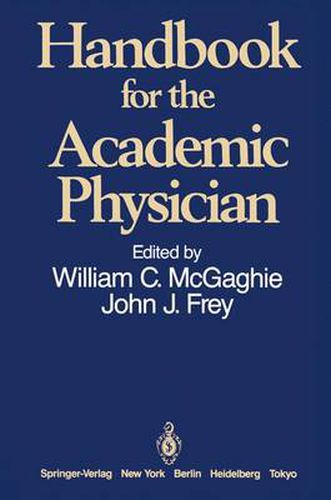Readings Newsletter
Become a Readings Member to make your shopping experience even easier.
Sign in or sign up for free!
You’re not far away from qualifying for FREE standard shipping within Australia
You’ve qualified for FREE standard shipping within Australia
The cart is loading…






This title is printed to order. This book may have been self-published. If so, we cannot guarantee the quality of the content. In the main most books will have gone through the editing process however some may not. We therefore suggest that you be aware of this before ordering this book. If in doubt check either the author or publisher’s details as we are unable to accept any returns unless they are faulty. Please contact us if you have any questions.
This book is a bold and useful tool that provides the concepts, principles, and facts needed to build and to strengthen a career in academic medi cine. Developing a high level of competency in academia requires the development of skills in addition to those in one’s own specialty or dis cipline. One needs skills for conducting research, meeting administrative responsibilities, and educating students and colleagues. These skills are not bells and whistles. They are the elements of academic life that make the position truly academic. This book provides the critical information needed to succeed in that world. Until now many academicians have learned about elements of their job outside their individual discipline by experience and through the obser vation of role models and mentors. In the complex, highly competitive, rapidly changing world of academic medicine there is no longer time for a prolonged apprenticeship. The institution is endangered when individ uals are selected for critical posts based upon skills in areas that may not be central to the principal responsibilities of the new position. How often one hears: He is a great scientist but he runs his department with a shoe box mentality.
She is a fantastic clinician, but she runs a committee as if she knows everything. I hate working with her.
How can a full professor be such a lousy teacher? All of the above are symptoms of the need for special skills.
$9.00 standard shipping within Australia
FREE standard shipping within Australia for orders over $100.00
Express & International shipping calculated at checkout
This title is printed to order. This book may have been self-published. If so, we cannot guarantee the quality of the content. In the main most books will have gone through the editing process however some may not. We therefore suggest that you be aware of this before ordering this book. If in doubt check either the author or publisher’s details as we are unable to accept any returns unless they are faulty. Please contact us if you have any questions.
This book is a bold and useful tool that provides the concepts, principles, and facts needed to build and to strengthen a career in academic medi cine. Developing a high level of competency in academia requires the development of skills in addition to those in one’s own specialty or dis cipline. One needs skills for conducting research, meeting administrative responsibilities, and educating students and colleagues. These skills are not bells and whistles. They are the elements of academic life that make the position truly academic. This book provides the critical information needed to succeed in that world. Until now many academicians have learned about elements of their job outside their individual discipline by experience and through the obser vation of role models and mentors. In the complex, highly competitive, rapidly changing world of academic medicine there is no longer time for a prolonged apprenticeship. The institution is endangered when individ uals are selected for critical posts based upon skills in areas that may not be central to the principal responsibilities of the new position. How often one hears: He is a great scientist but he runs his department with a shoe box mentality.
She is a fantastic clinician, but she runs a committee as if she knows everything. I hate working with her.
How can a full professor be such a lousy teacher? All of the above are symptoms of the need for special skills.